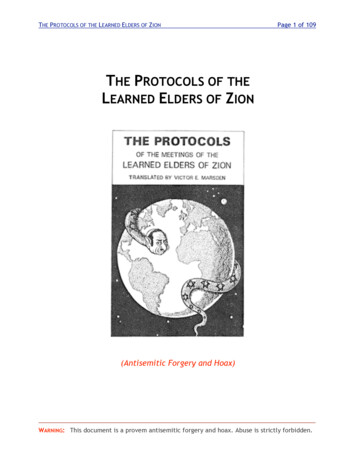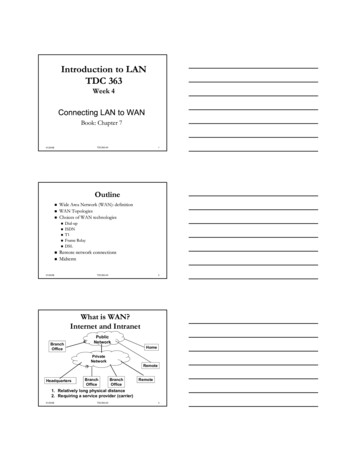
Transcription
Neal ShustermanUnwind
"If more people had been organ donorsUnwinding never would have happened."—THE ADMIRALThe Bill of LifeThe Second Civil War, also known as "The Heartland War," was a long and bloodyconflict fought over a single issue.To end the war, a set of constitutional amendments known as "The Bill of Life"was passed.It satisfied both the Pro-life and the Pro-choice armies.The Bill of Life states that human life may not be touchedfrom the moment of conception until a child reachesthe age of thirteen.However, between the ages of thirteen and eighteen, a parent may choose toretroactively "abort" a child . . . on the condition that the child's life doesn't "technically" end.The process by which a child is both terminated and yet kept alive is called"unwinding."
Unwinding is now a common, and accepted practice in society.Part OneTriplicate"J was never going to amount to much anyway, but now, statistically speaking, there's a betterchance that some part of me will go on to greatness somewhere in the world. I'd rather be partlygreat than entirely useless."—SAMSON WARD1 Connor"There are places you can go," Ariana tells him, "and a guy as smart as you has a decentchance of surviving to eighteen."Connor isn't so sure, but looking into Ariana's eyes makes his doubts go away, if only for amoment. Her eyes are sweet violet with streaks of gray. She's such a slave to fashion— alwaysgetting the newest pigment injection the second it's in style. Connor was never into that. He'salways kept his eyes the color they came in. Brown. He never even got tattoos, like so many kidsget these days when they're little. The only color on his skin is the tan it takes during thesummer, but now, in November, that tan has long faded. He tries not to think about the fact thathe'll never see the summer again. At least not as Connor Lassiter. He still can't believe that hislife is being stolen from him at sixteen.Ariana's violet eyes begin to shine as they fill with tears that flow down her cheeks whenshe blinks. "Connor, I'm so sorry." She holds him, and for a moment it seems as if everything isokay, as if they are the only two people on Earth. For that instant, Connor feels invincible,untouchable . . . but she lets go, the moment
passes, and the world around him returns. Once more he can feel the rumble of the freewaybeneath them, as cars pass by, not knowing or caring that he's here. Once more he is just amarked kid, a week short of unwinding.The soft, hopeful things Ariana tells him don't help now. He can barely hear her over therush of traffic. This place where they hide from the world is one of those dangerous places thatmake adults shake their heads, grateful that their own kids aren't stupid enough to hang out onthe ledge of a freeway overpass. For Connor it's not about stupidity, or even rebellion—it's aboutfeeling life. Sitting on this ledge, hidden behind an exit sign is where he feels most comfortable.Sure, one false step and he's roadkill. Yet for Connor, life on the edge is home.There have been no other girls he's brought here, although he hasn't told Ariana that. Hecloses his eyes, feeling the vibration of the traffic as if it's pulsing through his veins, a part ofhim. This has always been a good place to get away from fights with his parents, or when he justfeels generally boiled. But now Connor's beyond boiled—even beyond fighting with his momand dad. There's nothing more to fight about. His parents signed the order—it's a done deal."We should run away, "Ariana says. "I'm fed up with everything, too. My family, school,everything. I could kick-AWOL, and never look back."Connor hangs on the thought. The idea of kicking-AWOL by himself terrifies him. Hemight put up a tough front, he might act like the bad boy at school—but running away on hisown? He doesn't even know if he has the guts. But if Ariana comes, that's different. That's notalone. "Do you mean it?"Ariana looks at him with her magical eyes. "Sure. Sure I do. I could leave here. If youasked me."Connor knows this is major. Running away with an Unwind—that's commitment. The factthat she would do it moves him beyond words. He kisses her, and in spite of everything going onin his life Connor suddenly feels like the luckiest guy in the world. He holds her—maybe a littletoo tightly, because she starts to squirm. It just makes him want to hold her even more tightly,but he fights that urge and lets go. She smiles at him."AWOL . . ." she says. "What does that mean, anyway?""It's an old military term or something," Connor says. "It means 'absent without leave.'"Ariana thinks about it, and grins. "Hmm. More like 'alive without lectures.'"Connor takes her hand, trying hard not to squeeze it too tightly. She said she'd go if heasked her. Only now does he realize he hasn't actually asked yet.
"Will you come with me, Ariana?"Ariana smiles and nods. "Sure," she says. "Sure I will."***Ariana's parents don't like Connor. "We always knew he'd be an Unwind," he can just hearthem saying. "You should have stayed away from that Lassiter boy." He was never "Connor" tothem. He was always "that Lassiter boy." They think that just because he's been in and out ofdisciplinary school they have a right to judge him.Still, when he walks her home that afternoon, he stops short of her door, hiding behind atree as she goes inside. Before he heads home, he thinks how hiding is now going to be a way oflife for both of them.***Home.Connor wonders how he can call the place he lives home, when he's about to beevicted—not just from the place he sleeps, but from the hearts of those who are supposed to lovehim.His father sits in a chair, watching the news as Connor enters."Hi, Dad."His father points at some random carnage on the news. "Clappers again.""What did they hit this time?""They blew up an Old Navy in the North Akron mall.""Hmm," says Connor. "You'd think they'd have better taste.""I don't find that funny."Connor's parents don't know that Connor knows he's being unwound. He wasn't supposedto find out, but Connor has always been good at ferreting out secrets. Three weeks ago, whilelooking for a stapler in his dad's home office, he found airplane tickets to the Bahamas. Theywere going on a family vacation over Thanksgiving. One problem, though: There were onlythree tickets. His mother, his father, his younger brother. No ticket for him. At first he justfigured the ticket was somewhere else, but the more he thought about it, the more it seemedwrong. So Connor went looking a little deeper when his parents were out, and he found it. TheUnwind order. It had been signed in old-fashioned triplicate. The white
copy was already gone—off with the authorities. The yellow copy would accompany Connor tohis end, and the pink would stay with his parents, as evidence of what they'd done. Perhaps theywould frame it and hang it alongside his first-grade picture.The date on the order was the day before the Bahamas trip. He was going off to beunwound, and they were going on vacation to make themselves feel better about it. Theunfairness of it had made Connor want to break something. It had made him want to break a lotof things—but he hadn't. For once he had held his temper, and aside from a few fights in schoolthat weren't his fault, he kept his emotions hidden. He kept what he knew to himself. Everyoneknew that an unwind order was irreversible, so screaming and fighting wouldn't change a thing.Besides, he found a certain power in knowing his parents' secret. Now the blows he could dealthem were so much more effective. Like the day he brought flowers home for his mother and shecried for hours. Like the B-plus he brought home on a science test. Best grade he ever got inscience. He handed it to his father, who looked at it, the color draining from his face. "See, Dad,my grades are getting better. I could even bring my science grade up to an A by the end of thesemester." An hour later his father was sitting in a chair, still clutching the test in his hand, andstaring blankly at the wall.Connor's motivation was simple: Make them suffer. Let them know for the rest of theirlives what a horrible mistake they made.But there was no sweetness to this revenge, and now, three weeks of rubbing it in theirfaces has made him feel no better. In spite of himself he's starting to feel bad for his parents, andhe hates that he feels that way."Did I miss dinner?"His father doesn't look away from the TV. "Your mother left a plate for you."Connor heads off toward the kitchen, but halfway there he hears:"Connor?"He turns to see his father looking at him. Not just looking, but staring. He's going to tell menow, Connor thinks. He's going to tell me they're unwinding me, and then break down in tears,going on and on about how sorry sorry sorry he is about it all. If he does, Connor just mightaccept the apology. He might even forgive him, and then tell him that he doesn't plan to be herewhen the Juvey- cops come to take him away. But in the end all his father says is, "Did you lockthe door when you came in?""I'll do it now."
Connor locks the door, then goes to his room, no longer hungry for whatever it is his mothersaved for him.***At two in the morning Connor dresses in black and fills a backpack with the things thatreally matter to him. He still has room for three changes of clothes. He finds it amazing, when itcomes down to it, how few things are worth taking. Memories, mostly. Reminders of a timebefore things went so wrong between him and his parents. Between him and the rest of theworld.Connor peeks in on his brother, thinks about waking him to say good-bye, then decides it'snot a good idea. He silently slips out into the night. He can't take his bike, because he hadinstalled an antitheft tracking device. Connor never considered that he might be the one stealingit. Ariana has bikes for both of them though.Ariana's house is a twenty-minute walk, if you take the conventional route. Suburban Ohioneighborhoods never have streets that go in straight lines, so instead he takes the more directroute, through the woods, and makes it there in ten.The lights in Ariana's house are off. He expected this. It would have been suspicious if shehad stayed awake all night. Better to pretend she's sleeping, so she won't alert any suspicion. Hekeeps his distance from the house. Ariana's yard and front porch are equipped withmotion-sensor lights that come on whenever anything moves into range. They're meant to scareoff wild animals and criminals. Ariana's parents are convinced that Connor is both.He pulls out his phone and dials the familiar number. From where he stands in the shadowsat the edge of the backyard he can hear it ring in her room upstairs. Connor disconnects quicklyand ducks farther back into the shadows, for fear that Ariana's parents might be looking out fromtheir windows. What is she thinking? Ariana was supposed to leave her phone on vibrate.He makes a wide arc around the edge of the backyard, wide enough not to set off the lights,and although a light comes on when he steps onto the front porch, only Ariana's bedroom facesthat way. She comes to the door a few moments later, opening it not quite wide enough for her tocome out or for him to go in."Hi, are you ready?" asks Connor. Clearly she's not; she wears a robe over satin pajamas."You didn't forget, did you?""No, no, I didn't forget. . . ."
"So hurry up! The sooner we get out of here, the more of a lead we'll get before anyone knowswe're gone.""Connor," she says, "here's the thing . . ."And the truth is right there in her voice, in the way it's such a strain for her to even say hisname, the quiver of apology lingering in the air like an echo. She doesn't have to say anythingafter that, because he knows, but he lets her say it anyway. Because he sees how hard it is forher, and he wants it to be. He wants it to be the hardest thing she's ever done in her life."Connor, I really want to go, I do . . . but it's just a really bad time for me. My sister'sgetting married, and you know she picked me to be the maid of honor. And then there's school.""You hate school. You said you'd be dropping out when you turn sixteen.""Testing out," she says. "There's a difference.""So you're not coming?""I want to, 1 really, really want to . . . but I can't.""So everything we talked about was just a lie.""No," says Ariana. "It was a dream. Reality got in the way, that's all. And running awaydoesn't solve anything.""Running away is the only way to save my life," Connor hisses. "I'm about to be unwound,in case you forgot."She gently touches his face. "1 know," she says. "But I'm not."Then a light comes on at the top of the stairs, and reflexively Ariana closes the door a fewinches."Ari?" Connor hears her mother say. "What is it? What are you doing at the door?"Connor hacks up out of view, and Ariana turns to look up the stairs. "Nothing, Mom. Ithought I saw a coyote from my window and I just wanted to make sure the cats weren't out.""The cats are upstairs, honey. Close the door and go back to bed.""So, I'm a coyote," says Connor.
"Shush," says Ariana, closing the door until there's just a tiny slit and all he can see is the edge ofher face and a single violet eye. "You'll get away, I know you will. Call me once you'resomewhere safe." Then she closes the door.Connor stands there for the longest time, until the motion sensor light goes out. Beingalone had not been part of his plan, but he realizes it should have been. From the moment hisparents signed those papers, Connor was alone.***He can't take a train; he can't take a bus. Sure, he has enough money, but nothing's leavinguntil morning, and by then they'll be looking for him in all the obvious places. Unwinds on therun are so common these days, they have whole teams of Juvey-cops dedicated to finding them.The police have it down to an art.He knows he'd be able to disappear in a city, because there are so many faces, you neversee the same one twice. He knows he can also disappear in the country, where people are so fewand far between; he could set up house in an old barn and no one would think to look. But then,Connor figures the police probably thought of that. They probably have every old barn set up tospring like a rat trap, snaring kids like him. Or maybe he's just being paranoid. No, Connorknows his situation calls for justified caution—not just tonight, but for the next two years. Thenonce he turns eighteen, he's home free. After that, sure, they can throw him in jail, they can puthim on trial—but they can't unwind him. Surviving that long is the trick.Down by the interstate there's a rest stop where truckers pull off the road for the night. Thisis where Connor goes. He figures he can slip in the back of an eighteen-wheeler, but he quicklylearns that truckers keep their cargo locked. He curses himself for not having forethought enoughto consider that. Thinking ahead has never been one of Connor's strong points. If it was, he mightnot have gotten into the various situations that have plagued him over these past few years.Situations that got him labels like "troubled" and "at risk," and finally this last label, "unwind."There are about twenty parked trucks, and a brightly lit diner where half a dozen truckerseat. It's 3:30 in the morning. Apparently truckers have their own biological clocks. Connorwatches and waits. Then, at about a quarter to four, a police cruiser pulls silently into the truckstop. No lights, no siren. It slowly circles the lot like a shark. Connor thinks he can hide, until hesees a second police car pulling in. There are too many lights over the lot for Connor to hide inshadows, and he can't bolt without being seen in the bright moonlight. A patrol car comes aroundthe far end of the lot. In a second its headlights will be on him, so he rolls beneath a truck andprays the cops haven't seen him.He watches as the patrol car's wheels slowly roll past. On the other side of theeighteen-wheeler the second patrol car passes in the opposite direction.
Maybe this is just a routine check, he thinks. Maybe they're not looking for me. The more hethinks about it, the more he convinces himself that's the case. They can't know he's gone yet. Hisfather sleeps like a log, and his mother never checks on Connor during the night anymore.Still, the police cars circle.From his spot beneath the truck Connor sees the driver's door of another eighteen-wheeleropen. No—it's not the driver's door, it's the door to the little bedroom behind the cab. A truckeremerges, stretches, and heads toward the truckstop bathrooms, leaving the door ajar.In the hairbreadth of a moment, Connor makes a decision and bolts from his hiding spot,racing across the lot to that truck. Loose gravel skids out from under his feet as he runs. Hedoesn't know where the cop cars are anymore, but it doesn't matter. He has committed himself tothis course of action and he has to see it through. As he nears the door he sees headlights arcingaround, about to turn toward him. He pulls open the door to the truck's sleeper, hurls himselfinside, and pulls the door closed behind him.He sits on a bed not much bigger than a cot, catching his breath. What's his next move?The trucker will be back. Connor has about five minutes if he's lucky, one minute if he's not. Hepeers beneath the bed. There's space down there where he can hide, but it's blocked by two dufflebags full of clothes. He could pull them out, squeeze in, and pull the duffle bags back in front ofhim. The trucker would never know he's there. But even before he can get the first duffle bagout, the door swings open. Connor just stands there, unable to react as the trucker reaches in tograb his jacket and sees him."Whoa! Who are you? What the hell you doin' in my truck?"A police car cruises slowly past behind him."Please," Connor says, his voice suddenly squeaky like it was before his voice changed."Please, don't tell anyone. I've got to get out of this place." He reaches into his backpack,fumbling, and pulls out a wad of bills from his wallet. "You want money? I've got money. I'llgive you all I've got.""I don't want your money," the trucker says."All right, then, what?"Even in the dim light the trucker must see the panic in Connor's eyes, but he doesn't say athing."Please," says Connor again. "I'll do anything you want. ."
The trucker looks at him in silence for a moment more. "Is that so?" he finally says. Then hesteps inside and closes the door behind him.Connor shuts his eyes, not daring to consider what he's just gotten himself into.The trucker sits beside him. "What's your name?""Connor." Then he realizes a moment too late he should have given a fake name.The trucker scratches his beard stubble and thinks for a moment. "Let me show yousomething, Connor." He reaches over Connor and grabs, of all things, a deck of cards from alittle pouch hanging next to the bed. "Did ya ever see this?" The trucker takes the deck of cardsin one hand and does a skillful one-handed shuffle. "Pretty good, huh?"Connor, not knowing what to say, just nods."How about this?" Then the trucker takes a single card and with sleight of hand makes thecard vanish into thin air. Then he reaches over and pulls the card right out of Connor's shirtpocket. "You like that?"Connor lets out a nervous laugh."Well, those tricks you just saw?" The trucker says, "I didn't do em.""I . . . don't know what you mean."The trucker rolls up his sleeve to reveal that the arm, which had done the tricks, had beengrafted on at the elbow."Ten years ago I fell asleep at the wheel," the trucker tells him. "Big accident. I lost anarm, a kidney, and a few other things. I got new ones, though, and I pulled through." He looks athis hands, and now Connor can see that the trick-card hand is a little different from the other one.The trucker's other hand has thicker fingers, and the skin is a bit more olive in tone."So," says Connor, "you got dealt a new hand."The trucker laughs at that, then he becomes quiet for a moment, looking at his replacementhand. "These fingers here knew things the rest of me didn't. Muscle memory, they call it. Andthere's not a day that goes by that I don't wonder what other incredible things that kid who ownedthis arm knew, before he was unwound . . . whoever he was."
The trucker stands up. "You're lucky you came to me," he says. "There are truckers out therewho'll take whatever you offer, then turn you in anyway.""And you're not like that?""No, I'm not." He puts out his hand—his other hand—and Connor shakes it. "JosiasAldridge," he says. "I'm heading north from here. You can ride with me till morning."Connor's relief is so great, it takes the wind right out of him. He can't even offer athank-you."That bed there's not the most comfortable in the world," says Aldridge, "but it does thejob. Get yourself some rest. I just gotta go take a dump, and then we'll be on our way." Then hecloses the door, and Connor listens to his footsteps heading off toward the bathroom. Connorfinally lets his guard down and begins to feel his own exhaustion. The trucker didn't give him adestination, just a direction, and that's fine. North, south, east, west—it doesn't matter as long asit's away from here. As for his next move, well, first he's got to get through this one before hecan think about what comes next.A minute later Connor's already beginning to doze when he hears the shout from outside."We know you're in there! Come out now and you won't get hurt!"Connor's heart sinks. Josias Aldridge has apparently pulled another sleight of hand. He'smade Connor appear for the police. Abracadabra. With his journey over before it even began,Connor swings the door open to see three Juvey-cops aiming weapons.But they're not aiming at him.In fact, their backs are to him.Across the way, the cab door swings open of the truck he had hidden under just a fewminutes before, and a kid comes out from behind the empty driver's seat, his hands in the air.Connor recognizes him right away. It's a kid he knows from school. Andy Jameson.My God, is Andy being unwound too?There's a look of fear on Andy's face, but beyond it is something worse. A look of utterdefeat. That's when Connor realizes his own folly. He'd been so surprised by this turn of eventsthat he's still just standing there, exposed for anyone to see. Well, the policemen don't see him.But Andy does. He catches sight of Connor, holds his gaze, only for a moment . . .
. . . and in that moment something remarkable happens.The look of despair on Andy's face is suddenly replaced by a steely resolve bordering ontriumph. He quickly looks away from Connor and takes a few steps before the police grabhim—steps away from Connor, so that the police still have their backs to him.Andy had seen him and had not given him away! If Andy has nothing else after this day, atleast he'll have this small victory.Connor leans back into the shadows of the truck and slowly pulls the door closed. Outside,as the police take Andy away, Connor lies back down, and his tears come as sudden as a summerdownpour. He's not sure who he's crying for— for Andy, for himself, for Ariana—and notknowing makes his tears flow all the more. Instead of wiping the tears away he lets them dry onhis face like he used to when he was a little boy and the things he cried about were soinsignificant that they'd be forgotten by morning.The trucker never comes to check on him. Instead Connor hears the engine start and feelsthe truck pulling out. The gentle motion of the road rocks him to sleep.***The ring of Connor's cell phone wakes him out of a deep sleep. He fights consciousness.He wants to go back to the dream he was having. It was about a place he was sure he had beento, although he couldn't quite remember when. He was at a cabin on a beach with his parents,before his brother was born. Connor's leg had fallen through a rotted board on the porch intospiderwebs so thick, they felt like cotton. Connor had screamed and screamed from the pain, andthe fear of the giant spiders that he was convinced would eat his leg off. And yet, this was a gooddream—a good memory—because his father was there to pull him free, and carry him inside,where they bandaged his leg and sat him by the fire with some kind of cider so flavorful, hecould still taste it when he thought about it. His father told him a story that he can no longerremember, but that's all right. It wasn't the story but the tone of his voice that mattered, a gentlebaritone rumble as calming as waves breaking on a shore. Little-boy-Connor drank his cider andleaned back against his mother pretending to fall asleep, but what he was really doing was tryingto dissolve into the moment and make it last forever. In the dream he did dissolve. His wholebeing flowed into the cider cup, and his parents placed it gently on the table, close enough to thefire to keep it warm forever and always.Stupid dreams. Even the good ones are bad, because they remind you how poorly realitymeasures up.
His cell phone rings again, chasing away the last of the dream. Connor almost answers it. Thesleeper room of the truck is so dark, he doesn't realize at first that he's not in his own bed. Theonly thing that saves him is that he can't find his phone and he must turn on a light. When hefinds a wall where his nightstand should be, he realizes that this isn't his room. The phone ringsagain. That's when it all comes back to him, and he remembers where he is. Connor finds hisphone in his backpack. The phone ID says the call is from his father.So now his parents know he's gone. Do they really think he'll answer his phone? He waitsuntil voicemail takes the call, then he turns off the power. His watch says 7:30 a.m. He rubs thesleep out of his eyes, trying to calculate how far they've come. The truck isn't moving anymore,but they must have traveled at least two hundred miles while he slept. It's a good start.There's a knock on the door. "Come on out, kid. Your ride's over."Connor's not complaining—it was outrageously generous of this truck driver to do what hedid. Connor won't ask any more of him. He swings open the door and steps out to thank the man,but it's not Josias Aldridge at the door. Aldridge is a few yards away being handcuffed, and infront of Connor is a policeman: a Juvey-cop wearing a smile as big as all outdoors. Standing tenyards away is Connor's father, still holding the cell phone he had just called from."It's over, son," his father says.It makes Connor furious. I'm not your son! He wants to shout. I stopped being your sonwhen you signed the unwind order! But the shock of the moment leaves him speechless.It had been so stupid of Connor to leave his cell phone on—that's how they trackedhim—and he wonders how many other kids are caught by their own blind trust of technology.Well, Connor's not going the way Andy Jameson did. He quickly assesses the situation. Thetruck has been pulled over to the side of the interstate by two highway patrol cars and aJuvey-cop unit. Traffic barrels past at seventy miles per hour, oblivious to the little dramaunfolding on the shoulder. Connor makes a split-second decision and bolts, pushing the officeragainst the truck and racing across the busy highway. Would they shoot an unarmed kid in theback, he wonders, or would they shoot him in the legs and spare his vital organs? As he racesonto the interstate, cars swerve around him, but he keeps on going."Connor, stop!" he hears his father yell. Then he hears a gun fire.He feels the impact, but not in his skin. The bullet embeds in his backpack. He doesn't lookbehind him. Then, as he reaches the highway median, he hears another gunshot, and a small bluesplotch appears on the center divider. They're firing tranquilizer bullets. They're not taking himout, they're trying to take him
down—and they're much more likely to fire tranq bullets at will, than regular bullets.Connor climbs over the center divider, and finds himself in the path of a Cadillac that's notstopping for anything. The car swerves to avoid him, and by sheer luck Connor's momentumtakes him just a few inches out of the Caddy's path. Its side mirror smacks him painfully in theribs before the car screeches to a halt, sending the acrid stench of burned rubber up his nostrils.Holding his aching side, Connor sees someone looking at him from an open window of thebackseat. It's another kid, dressed all in white. The kid is terrified.With the police already reaching the center divider, Connor looks into the eyes of thisfrightened kid, and knows what he has to do. It's time for another split-second decision. Hereaches through the window, pulls up the lock, and opens the door.2 RisaRisa paces backstage, waiting for her turn at the piano.She knows she could play the sonata in her sleep—in fact, she often does. So many nightsshe would wake up to feel her fingers playing on the bed sheets. She would hear the music in herhead, and it would still play for a few moments after she awoke, but then it would dissolve intothe night, leaving nothing but her fingers drumming against the covers.She has to know the Sonata. It has to come to her as easily as breathing."It's not a competition," Mr. Durkin always tells her. "There are no winners or losers at arecital."Well, Risa knows better."Risa Ward," the stage manager calls. "You're up."She rolls her shoulders, adjusts the barrette in her long brown hair, then she takes the stage.The applause from the audience is polite, nothing more. Some of it is genuine, for she does havefriends out there, and teachers who want her to succeed. But mostly it's the obligatory applausefrom an audience waiting to be impressed.Mr. Durkin is out there. He has been her piano teacher for five years. He's the closest thingRisa has to a parent. She's lucky. Not every kid at Ohio State
Home 23 has a teacher they can say that about. Most StaHo kids hate their teachers, because theysee them as jailers.Ig
Unwinding is now a common, and accepted practice in society. P a r t O n e Triplicate " J w a s n e v e r go i n g to











